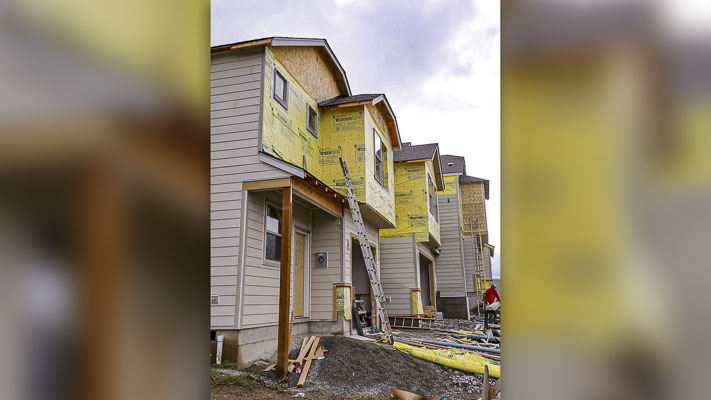
Economic and Revenue Forecast Council executive director points to a down trend in residential construction activity in expressing concerns
Brett Davis
The Center Square
Washington state’s revenue collections since the September forecast are $126 million, or 6.3%, above expectations. But that good news at Friday morning’s Economic and Revenue Forecast Council’s virtual meeting was tempered by concerns about the heightened risk of a recession.
In the parlance of ERFC Executive Director Stephen Lerch, Washington had “a positive variance of $126 million.”
Despite the uptick in revenue, Lerch pointed to monthly data through September from the U.S. Census Bureau showing residential construction activity in Washington and the U.S. has trended down since July, a possible indicator of a slowing economy.
“What you can see is really since about the middle of summer, the trend is certainly downward,” he told the council. “So we are starting to see, really, a slowdown in construction activity for both single- and multi-family homes.”
Mirroring a national trend, Seattle home prices declined in June, July, and August, according to information Lerch presented from the Case-Shiller Home Price Indices.
“Again, on a year-over-year basis, they’re still growing,” Lerch said. “They’re still higher.”
He provided some context regarding home prices.
“In August of this year, prices were certainly still on the order of 11% above where they were in August of 2021,” Lerch explained. “But as the sidebar notes, we’ve now seen a couple of months where prices have actually come down. So they’re still above their year-ago levels, but we’re seeing a couple of months where home prices are starting to come down a bit.”
Concerns about a possible recession permeated Lerch’s presentation to the council.
He pointed to several factors stoking fears that an economy already beset by record-breaking inflation and high gas prices could get worse, including the rise in interest rates, several polls of economists that indicate they think a recession is coming, and a leading indicator hinting at a downturn in the business cycle.
“We’re expecting that ultimately, the federal funds rate will get to a range of four-and-half to four-and-three-quarters of a percent by March of 2023, so that is pretty consistent with what the Federal Reserve said,” Lerch stated.
On Wednesday, the Federal Reserve approved a fourth-straight rate hike of three-quarters of a percentage point as part of its plan to bring down inflation.
Lerch pointed to a canvassing last month of a number of economists – including a Blue Chip Survey, a Wall Street Journal Forecasting Survey, and a Bloomberg Economist Survey – that show a majority of respondents anticipate a recession in the next year.
“And you can see these are rather pessimistic views,” Lerch noted.
Also suggesting a recession is on the way: the Organization for Economic Cooperation and Development’s composite leading indicator for the U.S., which includes housing starts, new orders for durable goods, stock prices, interest rates, consumer confidence, and weekly hours worked in manufacturing.
“It’s supposed to give a sense when the business cycle is turning,” Lerch explained. “In other words, some sort of advanced warning of recessions. And you can see, the last three recessions, it certainly has turned down prior to the recession, and we see that it is turning down now.”
That doesn’t assure a recession is on the way, he said.
“But we can also see some periods where it has turned down and a recession did not happen imminently,” Lerch said. “This does not guarantee a recession, but it would certainly be one indicator that a recession may be coming.”
Despite signs the economy is slowing and the threat of a recession, it wasn’t all bad news.
“On the upside, we could see some improvements in labor productivity, which would among other things, help with lowering inflation and would keep the economy going at a bit stronger pace,” Lerch said.
The next monthly revenue collection report will be out on Nov. 14. The final revenue forecast of the year is set for Nov. 18.
This story was first published by The Center Square Washington.
Also read:
- House Democrats advance $18B in tax hike proposals as session winds downHouse Democrats in Washington advanced several tax hike proposals as the legislative session nears its end, aiming to address a major budget shortfall.
- Republican budget leaders see showdown ahead as Senate Democrats approve trio of major tax increasesSenate Democrats in Washington have approved major tax increases, prompting Republican budget leaders to warn of a growing showdown ahead.
- Representatives from the 18th and 20th Legislative Districts to hold joint town hall on May 3Lawmakers from the 18th and 20th Legislative Districts will host a joint town hall on May 3 at Battle Ground City Hall to review the legislative session and hear from residents.
- Expect delays on northbound I-5 near Ridgefield through May 9Northbound I-5 travelers near Ridgefield should expect delays through May 9 as crews work on improvements at the Exit 14 off-ramp to support future development.
- Brandon Erickson announces candidacy for Clark County Charter Review CommissionBrandon Erickson has announced his candidacy for the Clark County Charter Review Commission, seeking Position 1 in District 2.
- Clark County Sheriff’s Office investigating a reported burglary that led to apparent suicideThe Clark County Sheriff’s Office is investigating a reported burglary in Vancouver that ended with the apparent suicide of Charles Gardiner, interim chief of the Cowlitz Tribal Public Safety Department.
- POLL: Why did voters reject all three tax proposals in the April 22 special election?Clark County voters rejected all three tax measures on the April 22 special election ballot, prompting questions about trust, affordability, and communication.











